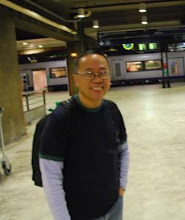 |
| DR. JOJO VALENCIA IV AND HIS CLAY SANTOS |
For a long time now, Dr. Jojo Valencia IV has had an unconventional career, shaped by his lifelong passion for antiques and sacred art. As a
child growing up in San Fernando, he held a fascination for the santos that
were carried out for procession on the streets of the capital town every ‘Maleldo’ or Holy
Week. In college, as a pre-med student in Baguio, he was asked to organize a
“santo” exhibit at St. Louis University, which he successfully staged, and
which prompted him to start collecting religious art. He pursued this antique
collecting interest, while doing his medical practice, and parlayed that into a
viable home business: buying and selling antiques.
 |
| STA. INES / SAN JOSE |
 |
| SAN ROQUE / SAN JUAN SAHAGUN |
Once he got started again with his clay modelling hobby, there was no stopping this talented doctor. “But the trouble with modelling clay is that it doesn’t really set and harden, and eventually the figure would become misshapen”, he said of his initial clay molding attempts. So, I had to look for another material”.
 |
| SAN VICENTE FERRER / SAN MIGUEL ARCANGEL |
Dr. Valencia turned to using pottery clay, used in ordinary earthenware products. Soon, he began moulding and shaping santo figures, which he based on existing Philippine church statuaries, estampitas, and images wrought from memory. The results were very encouraging, and, as he found his groove, he also found his own distinctive style, evident in his figures molded in the round, and in his paintings, as well.
 |
| KNEELING SAN ISIDRO |
His terracotta santos are short, almost squat, with stocky legs, in the case of male saints. There is also a “discernible feeling of plumpness” in the santos’s physique, at first sight—even the female saints exude this Rubenesque vibe.
 |
| SAN CLEMENTE / KNEELING ANGEL |
The vestments worn by the santos, that include the cape and tunic, show the lively exuberance and energy of Dr. Valencia’s style—with overly defined drapings, folds, and extra ruffling on hems and edgings. Indeed, the minutiae in the vestments are thorough and absorbing, borne out of the artist’s medical training perhaps, of paying meticulous attention to details. The figures are then hand-painted by Dr. Valencia himself, in oil paints. After awhile, he had hand-molded dozens of tabletop-size santos which he displayed around his house.
 |
| PLARIDEL CHURCH EXHIBIT |
It would not be long before Dr. Valencia’s private hobby would be know and spread to his circle of friends and clients, more so when he started posting them online. He started receiving offers for his works not only from his acquaintances but also from priests, church benefactors, known art aficionados and collectors, who took note of his appealing ecclesiastical creations. Some even wanted him to take commissioned projects. The turning point was when he finally accepted an important sponsored assignment to make terra cotta images of the barangay patrons of Plaridel town some 15 years ago, which went on permanent exhibit at the Plaridel Church in Bulacan.
 |
| THE ECSTACY OF STA. TERESA DE AVILA |
 |
| LA MUERTE DE SAN JOSE |
 |
| STO. ENTIERRO / STA. MARIA MAGDALENA |
He is often asked to exhibit his “obras maestras” like paintings and sculptures; last year, he was one of the featured artists in a gallery exhibit in Taal, Batangas, entitled “Artes y Tradiciones Filipinas”.
 |
| SAN SEBASTIAN / SAN GABRIEL ARCANGEL |
Today, the works of Dr. Jojo Valencia IV are prized by a few private collectors in Pampanga and beyond, not only for the inherent value of his unique sculptures. They are sought after for the hand-made quality of his pieces, a manual tradition now slowly vanishing --which makes for the rarity of his pieces. He does not mind the long hours it takes to create one quality piece, as this doctor obviously has the patience of a saint.
Once the doctor steps out of his office , that’s when the
artist in him, steps in—healing away his stress by molding images of faith,
feats of clay that have given him the confidence to create more, and his clients,
much personal satisfaction. Science and
art, they say are strange bedfellows, but for Dr. Jojo Valencia IV, there is no
such dissonance. In his chosen vocation and avocation, he has the best of both
worlds.
 |
| VIRGEN DE LA CANDELARIA /SAN VICENTE ZARAGOZA |
SOURCES:
Personal interview with Dr. J. Valencia, 11 May 2023,
Photos courtesy if Dr. Jojo Valencia IV




